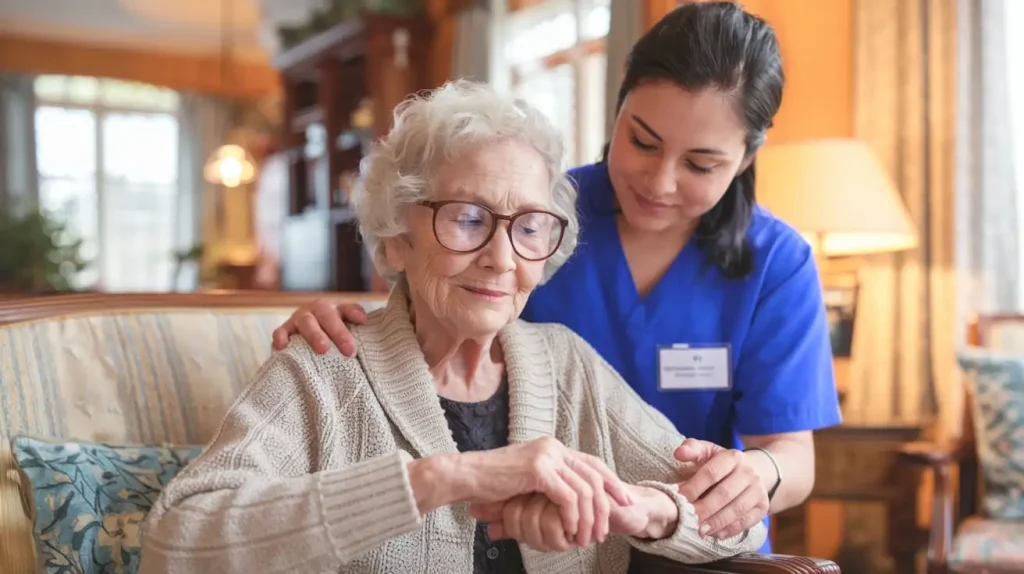
Benefits of In-Home Care for Elderly + 20 Caregiving Tips
One of the most important benefits of in-home care for elderly is the sense of security and peace it provides them. Seniors feel more comfortable when they live in a familiar environment alongside their family members. Home is where they have lived for y many years and have many memories. Therefore, this place gives them a sense of belonging and tranquility. Nowadays, many families prefer to care for their elderly at home so that they can live in a familiar and pleasant environment.
The advantages of home care are undeniable. Caring for seniors at home not only helps maintain their morale and well-being but also strengthens family relationships. However, this process requires attention, planning, and preparation to be carried out in the best possible way. Seniors do not like to leave their homes and move to nursing homes or elderly care centers. Most elderly individuals prefer to have a caregiver look after them rather than moving to a senior home or relying on relatives for help.
In this article from humanhealthmag, we examine the benefits of in-home care for elderly and having someone to care for an elderly person in their home. Because the best way to care for them is to take care of them in their own home. They are familiar with their home environment and find better peace there. If you want to take care of your elderly parents yourself or leave them in the hands of professional nurses, you need to pay close attention to its benefits and advantages.
Essential Services for Older Adults Living at Home
The goal of most families in hiring a senior caregiver is for their elderly loved one to have a companion and someone to talk to; however, the services provided by a caregiver for elderly care at home are much more extensive and vary depending on your needs and those of your elderly loved one.
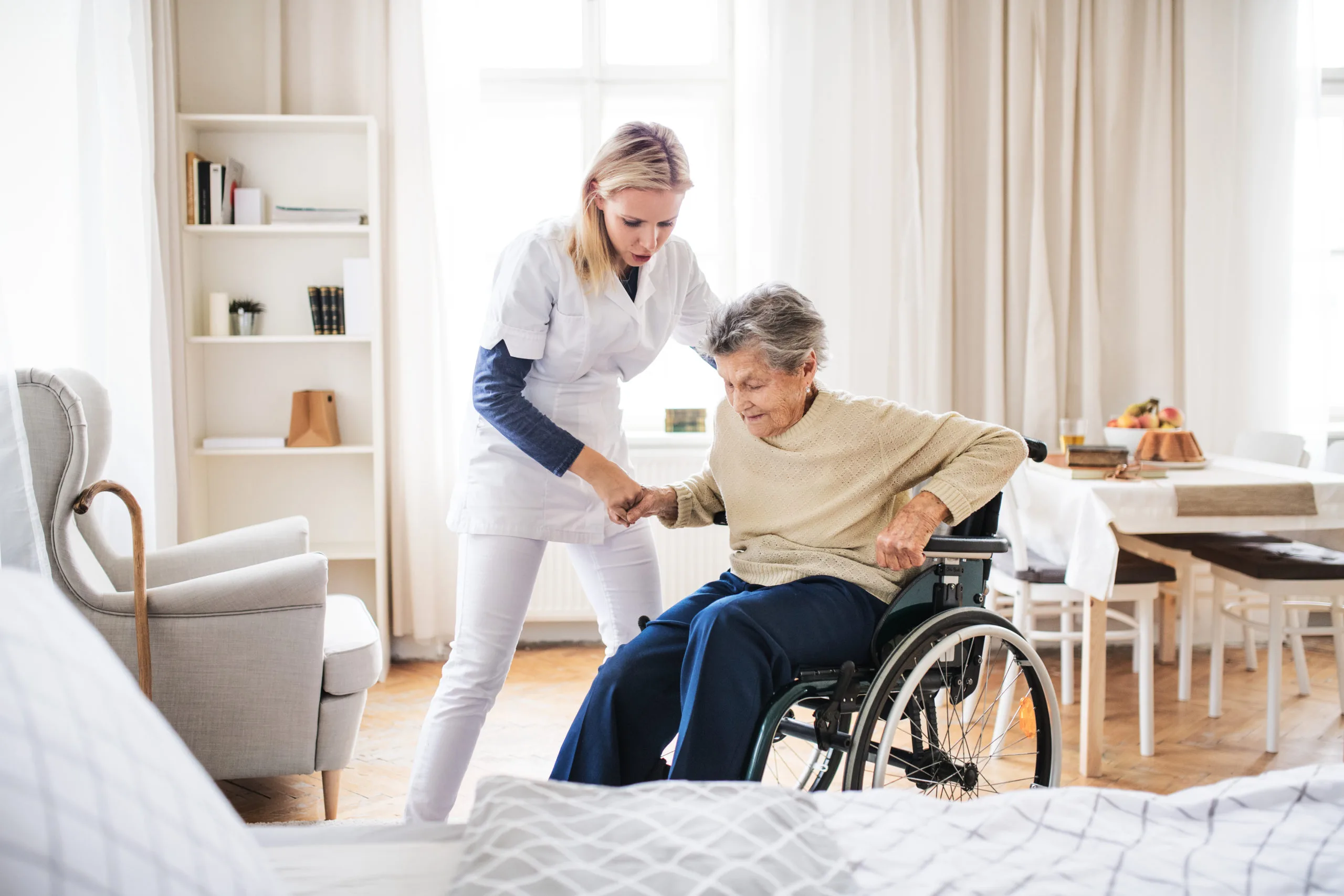
Apart from the benefits of in-home care for elderly whenever you decide to care for an elderly person at home, your life will undergo some changes, as caregiving becomes a priority and you take on the responsibility of their well-being. If we want to take a general look at the essential services that seniors may need at home, we can mention the following:
- Creating a calm and safe environment for senior care
- Improve mobility for seniors and preventing bedsores
- Ensuring proper and timely prescribed medication intake
- Monitoring the senior’s diet, maintaining a balanced diet with minimal salt intake for seniors, and promoting a healthy lifestyle
- Providing wheelchair elderly care services
- Assisting with daily personal activities (changing clothes, washing clothes, bathing, and other routine tasks)
- Regulating sleep schedules
- Monitoring blood pressure, blood sugar, and vital signs
- Personal hygiene and sanitation assistance such catheter replacement, wound dressing, and suture care
- Massage for seniors
- Providing companionship and emotional support
Benefits of In-Home Care for Elderly
Taking care of seniors at home is important in many ways. First and foremost, seniors need an environment that is familiar and calming. When an elderly person stays in their own home, they face fewer stressors caused by new environments such as nursing homes or hospitals. This significantly reduces anxiety and stress, making them feel more secure.
Additionally, families can closely monitor the health and well-being of their elderly loved ones. The presence of family members helps reduce feelings of loneliness and isolation while promoting healthy social interactions. What are the pros of in-home senior care?
1) Emotional Satisfaction of the Elderly
Most elderly individuals prefer to be cared for at home because they feel more familiar and secure in their own living environment. This familiarity contributes to their happiness, unless specific medical conditions prevent home care.
2) Maintaining a Sense of Independence
One of the main advantages of elderly care at home is that it allows them to retain a higher level of independence. They can participate in small tasks and make decisions regarding their daily lives, such as choosing meals, activities, and how to spend their time. In contrast, staying in a nursing home or hospital may create anxiety and fear of losing independence.
3) Cost-Effectiveness
Home care is often more financially sustainable than nursing home care, which can be very expensive. Even hiring a private caregiver at home can be more affordable compared to the costs of institutional care.
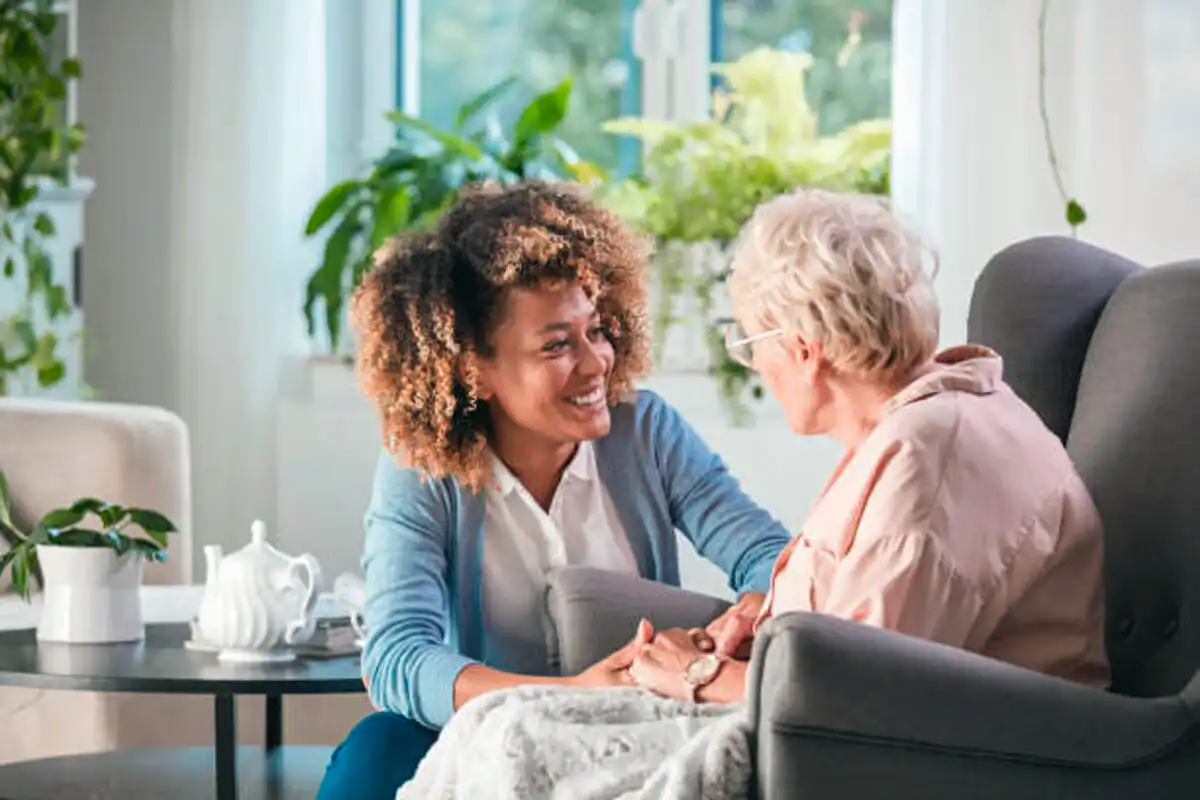
4) Maintaining Their Social Role
Loneliness and isolation are common issues among the elderly. Home care allows them to stay connected with family and friends, reducing feelings of loneliness. Being surrounded by loved ones helps maintain their social role, positively impacting their mental health and overall well-being.
5) Promoting Emotional Flexibility
Providing care at home ensures that the elderly receive personalized attention according to their needs and preferences. This helps them feel less isolated and alleviates some of their emotional struggles.
6) Better Personal Care
Nursing homes often have limited resources to provide individualized care due to the high number of residents. At home, caregivers can tailor personal care routines to the specific needs of the elderly, ensuring better hygiene and overall well-being.
7) Reduced Anxiety for Family Members
Home care reduces stress and worry among family members. It alleviates concerns related to feelings of guilt, fear of losing their loved ones, and uncertainty about the quality of institutional care.
8) Government Assistance for Elderly Care
Many governments offer financial aid programs to support benefits of in-home care for elderly. Families who choose to care for their elderly at home may qualify for these benefits, making it essential to consult a professional to explore available support options.
9) Faster Recovery After Surgery
Research has shown that elderly individuals who receive post-surgical care at home recover faster than those in nursing homes or medical centers. The home environment is generally cleaner and free from hospital-acquired infections, which promotes a quicker recovery.
10) Continuing Personal Interests, Such as Pet Care
Many elderly individuals enjoy taking care of pets, which helps combat loneliness and reduce the risk of heart disease. Home care enables them to maintain their hobbies and personal interests, significantly benefiting their emotional well-being.
11) Encouraging Physical Activity
Elderly individuals who receive home care have better opportunities to engage in physical activities such as walking and going to the park with family members. These activities help maintain their mental and physical health, whereas nursing home residents may have fewer opportunities for exercise, leading to an increased risk of depression.
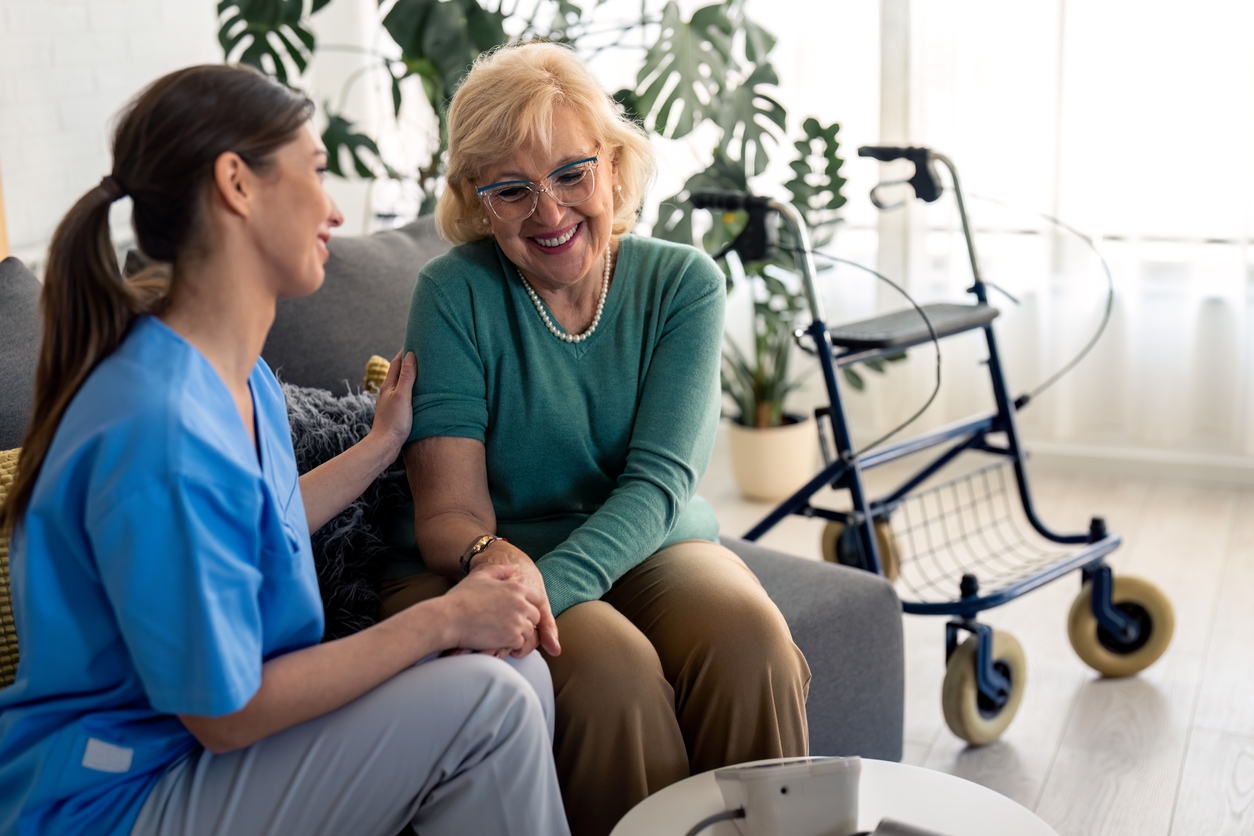
Important Considerations for Elderly Care at Home
How to care seniors at home? It is important to know that caring for an elderly person at home can be challenging and demanding for family members. The children and In-home caregivers of the elderly should be familiar with ways to ensure their comfort. After understanding the benefits of in-home care for elderly, in the following, we will explore some key aspects of elderly care at home.
1. Creating a Routine in-home care Plan for the Elderly at Home
Patients and seniors feel better when they have a structured daily routine. A caregiver or family member should discuss the senior’s daily schedule with them and even prepare a list that includes all their essential needs. This list should cover all daily activities, such as:
- Meal times
- Sleep and wake-up schedules
- Frequency of bathing per week
- Exercise and leisure activities
- Medication schedules
2. Considering the Dietary Habits of the Elderly
A caregiver must take the senior’s eating habits into account. If the elderly person has difficulty eating, the caregiver should make extra efforts in this regard. He/She can prepare meals for elderly with no teeth. It is essential to prepare meals that they enjoy, as dietary habits do not change overnight. Golden nutrition tips for elderly care at home:
- Whenever possible, make meals tasty and visually appealing.
- If the senior has a low appetite, create a list of their favorite foods.
- Encourage exercise to stimulate their appetite.
- Serve meals with a moment of gratitude or prayer to create a sense of spiritual comfort.
- Avoid high-calorie, empty-nutrient foods like sweets, as seniors require fewer calories.
- If the senior eats very little, offer small portions more frequently. Include fresh fruits, carrots, celery, and other nutritious items in their diet.
- Even for bedridden or wheelchair-bound individuals, light physical activity can improve circulation and support muscle-brain coordination.
- If a senior has partial paralysis, food may accumulate on one side of the mouth. Gently push the food from the outside of the cheek to the other side to assist with chewing.
- Cut, mash, or puree food to make chewing and swallowing easier, especially for seniors with dentures or swallowing difficulties.
3. Maintaining Oral and Dental Hygiene for Seniors
After each meal, seniors should brush their teeth. If they are unable to do so, the caregiver should attention to dental care for seniors. He/she can use a soft toothbrush to assist them. It is also recommended to use mouthwash. Dentures should be removed and cleaned daily, and lip balm can be applied to keep their lips moisturized. Key oral hygiene tips for elderly care at home:
- Seniors may experience dental issues such as cavities, dentures, or difficulty chewing and swallowing. Their meals should be adjusted accordingly—soft and easy-to-swallow foods are preferable.
- In some cases, alternative feeding methods may be necessary to provide proper nutrition.
- Watch for signs of infection, such as pain, redness at the injection or feeding tube site, or fever.
- Always feed the senior while they are in an upright position, and use a napkin or towel under their chin to prevent spills.
- Before serving food, taste it to ensure it is at a safe temperature and has an appealing flavor.
4. Monitoring the Elderly’s Digestive System
The caregiver should pay close attention to the elderly person’s digestive system and monitor any unusual changes. If necessary, they should consult a doctor.
5. Addressing the Physical Needs of the Elderly
The caregiver must first focus on the elderly person’s physical needs before attending to their emotional, spiritual, and psychological well-being. Ensuring their comfort—such as being pain-free, eating properly, and maintaining a healthy digestive system—plays a crucial role in their quality of life.
6. Helping the Elderly Maintain a Healthy Sleep Pattern
Many elderly individuals tend to sleep during the day and struggle with sleep at night. This poor sleeping habit or sleepiness in the elderly can also affect those who live with them. Sometimes, living in an unfamiliar environment can cause discomfort, impacting both sleep and appetite and leading to anxiety.
7. Incorporating Exercise into the Elderly’s Daily Routine
Caregivers should encourage the elderly to engage in light physical activities daily, even for a short period.
8. Essential Equipment for Immobile Seniors
For bedridden seniors, it is recommended to use hospital beds and mattresses instead of regular bedding to enhance their comfort and prevent complications.
9. Changing the Position of Immobile Seniors
If the elderly individual cannot move or change positions, the caregiver should reposition them every four hours to prevent bedsores. If the senior already has bedsores, the repositioning intervals should be reduced to less than four hours. Caregivers should also learn the correct techniques to avoid causing additional harm.
10. Preventing Bedsores in Immobile Seniors
To prevent bedsores, reposition the elderly person every 2–4 hours. Apply moisturizing creams and lotions to pressure points where the body makes contact with the bed. Keeping the skin moisturized, gentle massages, and regular repositioning can help prevent bedsores.
11. Hair Hygiene for the Elderly
It is advisable to keep the elderly person’s hair short for easier maintenance. The caregiver should assist with washing and grooming their hair regularly.
12. Nail Care for the Elderly
The caregiver should regularly trim the elderly person’s nails. Fingernails should be shaped to match the finger’s contour, while toenails should be cut straight across. Extra caution is required when trimming the nails of diabetic seniors.
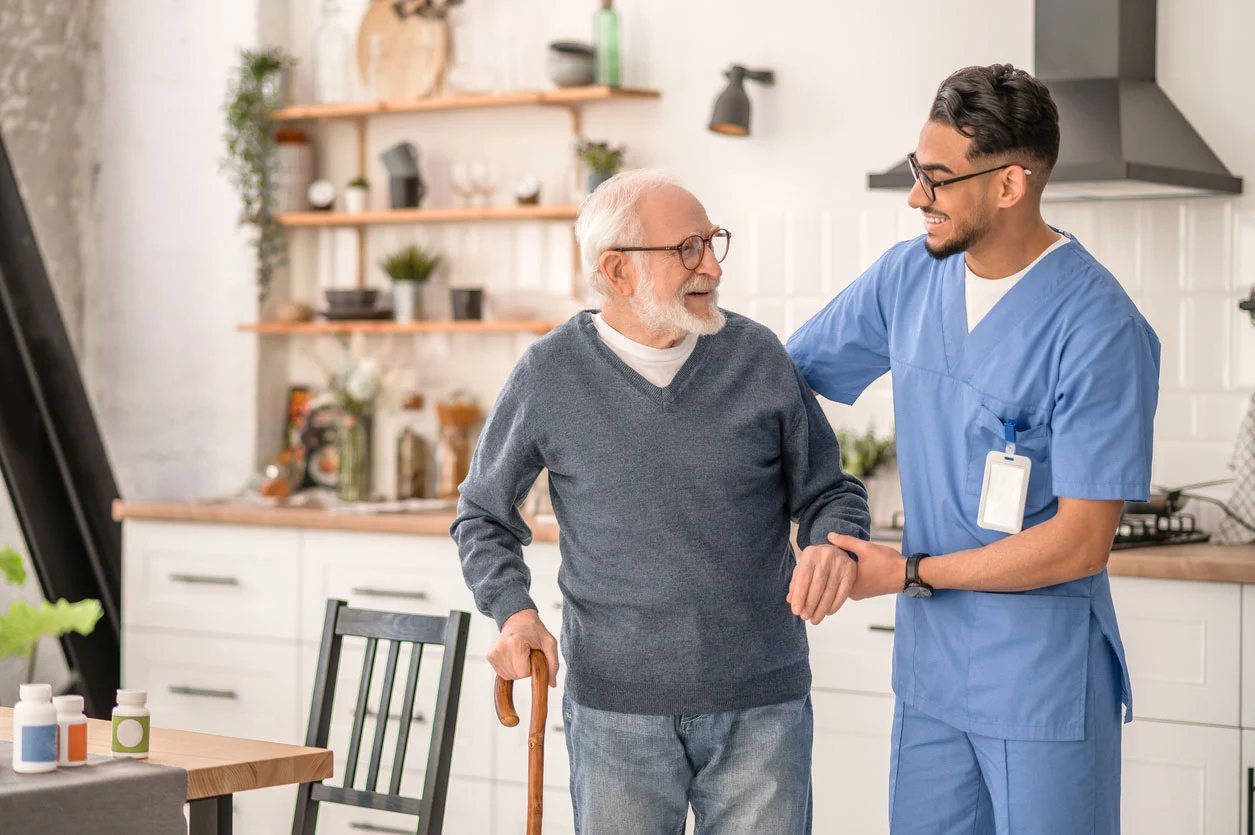
13. Managing Urinary Incontinence in the Elderly
The caregiver can use the following solutions to manage incontinence:
- Adult diapers
- Special absorbent sheets (available in hospitals)
- Mattress protectors (cover the mattress with a protector before placing the bedding)
14. Hand Hygiene for Caregivers
Caregivers must wash their hands with soap and water regularly to prevent the transmission of infections to the elderly person.
15. Storing Medications Safely
Medications should be stored securely and out of the reach of children.
16. Keeping a List of Important Contacts
A list of essential contact numbers—including doctors, nurses, and family members—should be readily accessible to the caregiver.
17. Having Essential Medical Information on Hand
The caregiver should have access to essential medical information, such as the elderly person’s medical ID or health insurance card.
18. Creating a Calming Environment for the Elderly
Encourage the elderly person to share happy memories and engage in relaxing activities. Such interactions can help alleviate pain and anxiety.
19. Caregiver’s Self-Care
Caregivers should also prioritize their own health. Taking short breaks throughout the day for rest or exercise can help restore energy and well-being.
20. Respecting the Elderly’s Beliefs and Traditions
Caregivers should respect the elderly person’s cultural and religious beliefs, which may include:
- Speaking in a preferred language
- Making healthcare and treatment decisions
- Following specific dietary habits
- Observing cultural and religious customs related to life and death
Concluding Remarks
In-home care for elderly, despite its numerous benefits and challenges, requires significant attention and effort. Elderly home care often means that seniors continue living in their familiar environment, allowing them to maintain their independence without relying on care facilities.
However, to fully benefit from home care, it is essential to address its challenges as well. These challenges include the need for constant supervision, managing complex medical treatments, and creating a suitable living environment for seniors. Families must consider both the physical and psychological needs of the elderly to make logical and appropriate decisions that enhance their quality of life. Additionally, educating and supporting caregivers is one of the key factors in ensuring the success of elderly home care.

Frequently Asked Questions
Why Is In-Home Care Beneficial for Seniors Compared to Nursing Homes?
In-home care allows seniors to stay in a familiar and comfortable environment, reducing stress and promoting emotional well-being. Unlike nursing homes, where care is often standardized, in-home care provides personalized attention tailored to the specific needs of the elderly. It also helps seniors maintain a sense of independence and control over their daily routines.
How Does In-Home Care Support the Mental Health of Elderly Individuals?
Living at home allows seniors to stay connected with family and friends, reducing feelings of loneliness and isolation. Engaging in familiar surroundings and participating in daily activities they enjoy can significantly improve their emotional well-being. Caregivers can also provide companionship, ensuring that seniors feel valued and supported.
How ِDoes In-Home Care Benefit Families of Elderly Individuals?
In-home care provides families with peace of mind, knowing that their loved one is receiving professional and compassionate care. It alleviates the stress and burden of caregiving, allowing family members to maintain their own lives while staying actively involved in the senior’s well-being. This balance strengthens family relationships and reduces the potential for caregiver burnout.
